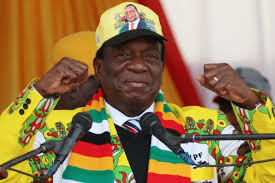
Mazowe Member of Parliament, and high-ranking Zanu PF official, Fortune Chasi, recently exonerated the Chinese from the brazen plunder of Zimbabwean resources and the brutal mistreatment of workers, but pointed at the mirror image of the country’s own governance. He essentially declared, in a spectacular moment of candor, that poor governance and corruption are the true architects of the Nation’s national disaster.
Coming from a figure of his stature within the ruling elite, could this be less of a political critique and more an unwitting admission of national failure? This confirmation may be the loudest echo yet of Frantz Fanon's chilling prognosis in The Wretched of the Earth, where he speaks of the "pitfalls of national consciousness". Fanon warned that the native middle class, upon inheriting the levers of power, would not transform the nation, but would instead step into the shoes of the former European settlement. In post-colonial Zimbabwe, the ruling elite, have tragically fulfilled this prophecy. They have become the transmission line for a rapacious, camouflaged capitalism, betraying the revolution by directly replacing the white colonial master as the primary gatekeepers of exploitation. The struggle for liberation, it seems, only liberated a select few to cannibalise the nation.
While Chasi’s honesty in acknowledging corruption and poor governance is a vital, albeit late, crack in the facade, one may boldly challenge the notion that these are the root cause. Corruption and maladministration are not the monster itself; they are merely the most visible, festering symptoms of a much larger, more malevolent beast, neocolonialism.
To claim that Zimbabwe’s socioeconomic crisis rests solely on poor local governance is to unintentionally align with the very narrative that our historical Western detractors have peddled for years. It asks us to believe that the Americans and Europeans are correct in arguing that the socio-economic chaos in Zimbabwe is a direct result of maladministration and corruption and not the illegal sanctions. Therefore, this exonerates the West and, by extension, other foreign entities like China, from their own exploitative roles. This logic is a dangerous distraction. Regarding to Zimbabwean and other African states reports, China, in its current operations, is the chief culprit in this neocolonial mess. It can be argued that they are the modern-day British South Africa Company (BSAC), only tenfold more aggressive and less concerned with long-term infrastructure maintenance. The Chinese entities are not passive recipients of corrupt deals; they are active conspirators, deliberately leveraging the weakness of the state for their own massive resource extraction. They come to a nation known to have an ailing governance structure and, rather than upholding global best practices, they dive headfirst into the muck, knowing that for a paltry bribe, they can secure licenses that would be unthinkable in a nation with robust institutions.
This current dynamic tragically exposes the true nature of the China-Zimbabwe relationship, stripping away the veneer of "all-weather friendship." This partnership is, in the eyes of the suffering Zimbabwean, a cynical, exploitative arrangement and a strategic shield against Western pressure. The Look East Policy, adopted after Western nations imposed targeted sanctions in the early 2000s, was a necessary lifeline. In the global political theatre, China's economic and diplomatic backing, its use of the UN veto, is an invaluable political shield. The ruling elite, isolated from traditional credit markets due to US sanctions, uses China's capital as a desperate substitute. The Zimbabwean government leverages its mineral and agricultural wealth to secure loans and investment from China, essentially exchanging sovereign material for political protection.
This transaction, however, is not a brotherhood scenario; it is a transactional pact that benefits a small political elite while the nation’s resources are depleted. China is essentially exploiting Zimbabwe's desperate isolation, a weakness created by Western sanctions, to secure lucrative, high-yield, and often non-transparent deals. The relationship is a classic model of a superpower exerting dominance not through military conquest, but through debt dependency and resource acquisition in a politically compromised state. Zimbabwe, in its compromised state, has been accused of mortgaging its future on this basis, trading its sovereign material assets, its minerals and potential economic independence, for immediate political and financial relief which only benefits the ruling elite and not the entire nation. This is a relationship of "rider and horse," not equals, an exploitative one explained by Ngugi wa Thiongo in the book The Trial of Dedan Kimathi.
The sadness of this current reality is compounded by the profound sense of betrayal. China was not just another global player to Zimbabwe; it was a staunch, ideological "big brother" during the liberation war. The Chinese forged Zimbabwean freedom fighters in the fires of their own revolutionary ethos, instilling principles of strict ideological discipline, selflessness, and patriotism. Guerrillas marched to the tune of Maoist principles, encapsulated in revolutionary songs like Nzira Dzemasoja, which even today serve as an anthem against corruption and for the upholding of right morals for everyone.
- Chamisa under fire over US$120K donation
- Mavhunga puts DeMbare into Chibuku quarterfinals
- Pension funds bet on Cabora Bassa oilfields
- Councils defy govt fire tender directive
Keep Reading
Oh, the bitter, lamentable irony! The nation that schooled Zimbabwean liberators in high-minded socialist ideals is now deploying its state-linked enterprises to ravage the very land heroes fought for. In Shurugwi, the scenic mountains have been scarred by open-cast chrome mining, leaving a landscape of devastation and artificial, unfilled pits, a perpetual monument to greed. The Great Dyke, the spine of our mineral wealth, is under siege, and in areas like Muzarabani/Mavuradonha, environmentalists weep as water supplies are affected and protected wilderness areas are encroached upon. Encroaching Christmas Pass, the same story unfolds. More so, unsafe working conditions, and outright violence against workers, often with apparent immunity from prosecution which is the very picture of colonial-era exploitation.
This begs the most crucial question: Could the Chinese do this in their own country? The answer is unequivocally no. The Chinese legal apparatus is designed to prevent the very corporate and official malfeasance their companies allegedly engage in on Zimbabwean soil. Their deliberate flouting of environmental and labour laws, and their conspiratorial engagements in corruption, are acts that would invite the severest censure and punishment at home; death. This duality- the principled, disciplined nation abroad, and the complicit corporate predator in Zimbabwe, is the ultimate act of betrayal.
The Chinese have, in the span of a single generation, tainted the memory of their historic assistance. This is not mere political grumbling; it is a cultural and psychological injury. It has angered even the older generation who remember the sacrifice and camaraderie of the war years, to the point where, in a tragic, almost unbearable echo of colonial hangover and slave mentality, some lament that the Rhodesian settlers were "better bosses" because they at least developed industry and infrastructure alongside their exploitation. This is a devastating indictment that no amount of diplomatic rhetoric can erase.
Within Zimbabweans’ collective memory, stretching far beyond the betrayal by the elite, holds a bitter wisdom: When the land and its resources are threatened, Zimbabweans rise. This principle is the very heartbeat of the Nation’s history, a warning etched in blood, hence the statement Zimbabwe Ndeyeropa. For instance, in the period of 1684-1695, The Rozvi state, under the legendary Changamire Dombo, rose to decisively defeat the Portuguese forces at battles like Maungwe and effectively expel them from the hinterland of the Mutapa state. This was a direct, successful revolt against foreign interference and the prazeros who sought to control trade and land.
The First Chimurenga/Umvukela (1896-1897) was a direct, violent reaction against the seizure of land, cattle, and the imposition of taxes by Cecil Rhodes' British South Africa Company. In the same vein, The Second Chimurenga/Umvukela (1966-1979), a guerrilla liberation war was fundamentally a war for the return of the land and resources that had been racially alienated, leading directly to the establishment of the independent state of Zimbabwe. Further, the fast-track land reform (2000s) though politically divisive, was mobilised and framed by the ruling party as the "Third Chimurenga", a final, violent confrontation to complete the repossession of land, demonstrating the enduring connection between land, sovereignty, and revolt in the Zimbabwean psyche.
To China, the message is clear, You are a world wonder, a beautiful country built on admirable principles of discipline and national development. You should showcase that character in Zimbabwe. Look to the examples of other global partners, like the Russians or even the British and Americans, though for Zimbabwe they cannot be trusted, in their current engagements with their allies, they are building long-term, mutually beneficial partnerships instead of engaging in cynical extraction.
They may be no need to exonerate Zimbabwean leaders, they must face the music for their role in this tragedy. But as a true "big brother," China must refuse to be a conspirator. It must return to the drawing board, honour its bilateral agreements, and apply the same brilliant principles that distinguish its own country. Only then can it reclaim its moral authority, and only then will the next generation not view this once-great ally as just another face of the same old, ugly neocolonial monster.











